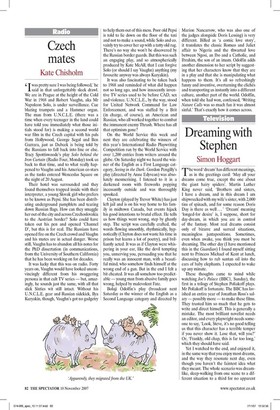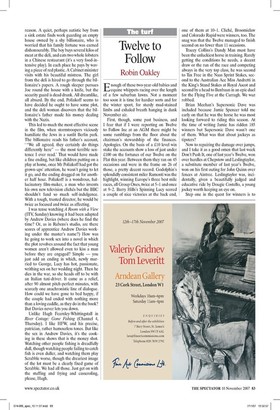Dreaming with Stephen
Simon Hoggart The word 'dream' has different meanings, as in the greetings card: 'May all your dreams come true, except the one about the giant hairy spiders'. Martin Luther King never said, 'Brothers and sisters, I have a dream, and in this dream I am shipwrecked with my wife's sister, with 2,000 tins of spinach, and for some reason Doris Day is there as well ... "Dream' meaning `longed-for desire' is, I suppose, short for day-dream, in which you are in control of the fantasy. Most real dreams consist only of bizarre and surreal situations, meaningless juxtapositions. Sometimes, even when awake, you think you must be dreaming. The other day (I have mentioned this in the Guardian) I found myself sitting next to Princess Michael of Kent at lunch, discussing how to rub suntan oil into the ears of baby elephants. I expected to wake up any minute.
These thoughts came to mind while watching Joe's Palace (BBC1, Sunday), the first in a trilogy of Stephen Poliakoff plays. Mr Poliakoff is fortunate. The BBC has lavished an entire year of Jonathan Ross's salary — possibly more — to make these films. They trusted him so much that he gets to write and direct himself. This is generally a mistake. The most brilliant novelist needs an editor, and every playwright needs someone to say, 'Look, Steve, it's no good telling us that this character has a terrible temper if you never show it. Lose that, will you?' Or, 'Frankly, old chap, this is far too long,' which they should have said.
Yet I watched to the end, and enjoyed it, in the same way that you enjoy most dreams, and the way they resonate next day, even though you haven't the faintest idea what they meant. The whole scenario was dreamlike, sleep-walking from one scene to a different situation to a third for no apparent reason. A quiet, perhaps autistic boy from a sink estate finds work guarding an empty house owned by a shy billionaire, who is worried that his family fortune was earned dishonourably. The boy buys several kilos of meat at the deli, and eats two whole lobsters in a Chinese restaurant (it's a very food-intensive play). In each place he pays by waving a piece of red plastic. A Cabinet minister visits with his beautiful mistress. The girl from the deli is hired to go through the billionaire's papers. A rough sleeper pursues Joe round the house with a knife, but the security guard is dead drunk. All dreamlike, all absurd. By the end, Poliakoff seems to have decided he ought to have some plot, and the deli woman discovers that the billionaire's father made his money dealing with the Nazis.
This led to much the most effective scene in the film, when stormtroopers viciously humiliate the Jews in a sunlit Berlin park. The billionaire reads his father's account, "We all agreed, they certainly do things differently here" — the most terrible sentence I ever read.' That would have made a fine ending, but like children putting on a play at home, once Mr Poliakoff had got the grown-ups' attention, he wasn't going to let it go, and the ending dragged on for another half hour. Poliakoff is a wondrous, hallucinatory film-maker, a man who invents his own new television clichés but the BBC shouldn't fund so much self-indulgence. With a tough, trusted director, he would be twice as focused and twice as affecting.
I was tense watching A Room with a View (ITV, Sunday) knowing it had been adapted by Andrew Davies (where does he find the time? Or, as in Rubens's studio, are there scores of apprentice Andrew Davies working under the master's name?) How was he going to work sex into a novel in which the plot revolves around the fact that young women aren't allowed even to kiss a man before they are engaged? Simple — you just add an ending in which, newly married to George, Lucy has hot, passionate, writhing sex on her wedding night. Then he dies in the war, so she heads off to be with an Italian taxi-driver. It came as a relief, after 90 almost pitch-perfect minutes, with scarcely one anachronistic line of dialogue. How could we have gone to bed happy, if the couple had ended with nothing more than a loving cuddle, as they do in the book? But Davies never lets you down.
Unlike Hugh Fearnley-Whittingstall in River Cottage: Gone Fishing (Channel 4, Thursday). I like HFW, and his precise, patrician, rather humourless tones. But like the sex in Andrew Davies, it's the cooking in these shows that is the money shot. Watching other people fishing is dreadfully dull, though watching people failing to catch fish is even duller, and watching them play Scrabble worse, though the dreariest image of the lot must be a clearly fixed game of Scrabble. We had all those. Just get on with the stuffing and frying and casseroling, please, Hugh.






































































 Previous page
Previous page